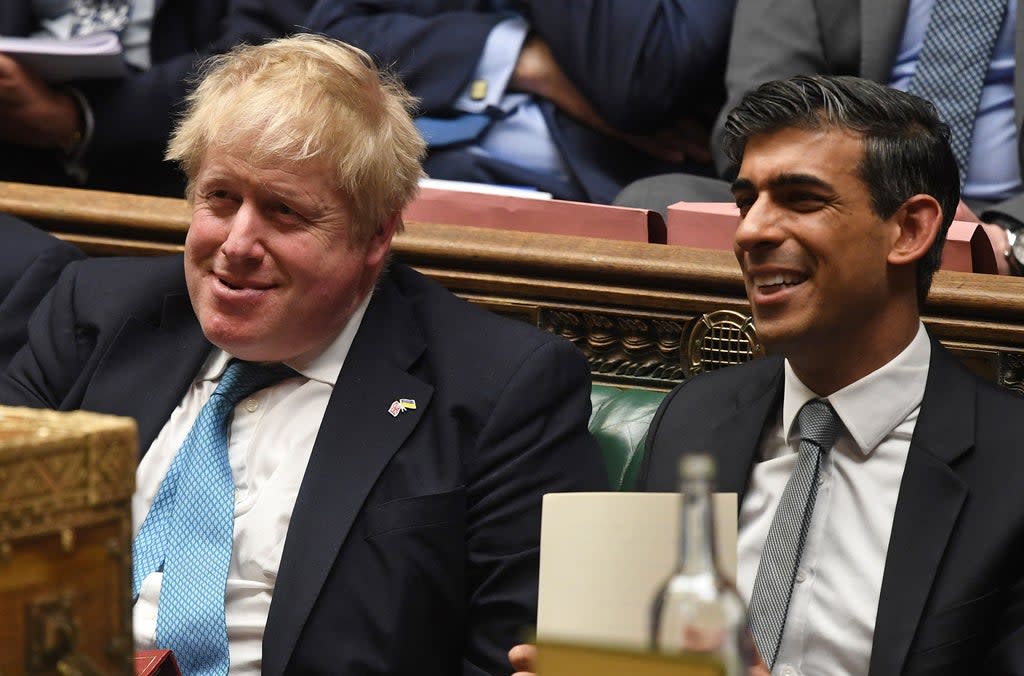Voices: Party fines mean nothing to rich men like Sunak and Johnson – they only punish the poor

Yesterday, it was reported that Boris Johnson and Rishi Sunak have received fines from the Metropolitan Police for breaching lockdown restrictions by organising and/or attending parties during the very lockdowns they imposed.
While this could be considered a moment worth celebrating – after all, many believed Sunak and Johnson wouldn’t receive any kind of punishment for the parties, nor their deceit around them – receiving nothing more than a fine is meaningless to two men with a combined estimated net worth of more than £3bn.
A poll from YouGov shows many are disappointed with the pair receiving a fine alone. It found a majority of Brits (57 per cent) think Johnson should resign after being issued a fine for a breach of Covid-19 rules and 75 per cent say that Johnson knowingly lied about breaching Covid rules.
Considering the wealth of Johnson and Sunak, it’s hard to see a fine as anything more than a slight slap on the wrist – if that.
Financial penalties have long been a problematic punishment for crimes. When a fine is considered steep or life-altering to many, but an easy number to pay off and forget about to others, it turns law and order into something obviously unequal. And when poor people are more likely to commit petty crimes as a result of their financial disadvantages, but are even more likely to be a victim of crime, charging law-breakers money can never be an appropriate punishment.
This was and still is especially true in the context of the Covid lockdowns. Throughout the course of the pandemic, multiple social activities were made illegal and breaking the rules came with hefty fines. An £800 fine for anyone attending a house party of more than 15 people was introduced in January last year.
Fines are inherently classist, as they most significantly affect the poorest in the country. An £800 penalty will not come close to financially or emotionally impacting a billionaire like Rishi Sunak or a millionaire like Boris Johnson. But it will impact the working class.
Across 2020 and 2021, more than 100,000 fines for breaking lockdown restrictions were handed out, including 3,528 fines for gathering indoors, and fines of up to £10,000 for people hosting large gatherings.
Among them was a man in Ilford threatened with a £10,000 fine – more than his annual wage – for an event marking a friend’s death and a 66-year-old man from Brockley, who was accosted by police for meeting friends at his allotment to break up the loneliness and was handed a £100 fine.
There was also the man who organised an online fundraiser to help pay his rent, as he struggled with mental health difficulties and economic woes in lockdown. He protested that it hadn’t been a “party”, but still ended up being prosecuted.
As soon as fines were introduced as a means to enforce the new lockdown laws, it was clear this only applied to the lower, working and middle classes. Ultimately, fines allowed the rich to continue to break lockdown rules, while trapping poorer people in their homes.
Fines, put simply, are not a punishment for the rich when they remain the same amount regardless of how much a person earns. Only after protests are fines occasionally reduced to accommodate the income of a person in poverty. Yet, they are never increased to account for a rich law-breaker’s millions (or billions in the case of Sunak). Fines are so throwaway to rich people, they rarely stop them from breaking the law again.
This was proven last year, when Boris Johnson received a County Court Judgement. Being faced with a £535 fine has clearly not stopped him from going on to commit a crime with financial penalties attached.
Rich people are free to consider financial penalties as a minor inconvenience and expense, while many working class people facing fines – for anything from parking to breaking lockdown rules to struggling with debt – are severely impacted by the emotional distress and financial stress involved. The existence of fines as a method of reducing crime sends a clear message to the rich: you can break the law, so long as you have the cash.

 Yahoo News
Yahoo News 
